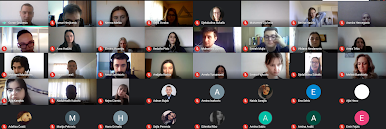We are proud to share with you a short collection of book essays written by our senior students.The students were tasked with writing the essays for their Contemporary English Language 8 course. The collection includes essays covering a variety of books so take a look at it and see if there is a book you need to add to your reading list:
UnZe English Department Hub
Thursday, 19 August 2021
Book Reviews
Tuesday, 1 June 2021
End of the semester
As the end of the semester is slowly approaching, the Department of English Language and Literature decided to celebrate and organize a short ceremony. This Monday, some of our sophomore and junior students, the ones who were particularly active and hardworking during classes, received books in the said ceremony.
We would like to thank all the professors, teaching assistants, and students who took part in the event!
The awarded students: Ajla Karajkić, Šejla Perenda, Hana Mujezinović, Ahmed Spahić, Ajla Heco, Amina Avdić, and Mehmed Muratović.
Monday, 10 May 2021
2021 English Language Day
Today our Department hosted the “2021 English Language Day” conference. Students had a chance to present their work and talk about various topics in the field of English language and literature. At the same time, this provided our students with an opportunity to meet up and interact, which is particularly important during the pandemic.

The conference was opened by the head of the department, Assoc. Prof. Edina Rizvić-Eminović, and it included presentations by thirteen participants as well as short Q&A sessions following each presentation. We are looking forward to all future events of this type, and we would like to thank all the participants for taking part in the event.

Monday, 26 April 2021
Online Career Day - Closing Event
The third and final event of the Online Career Day project was brought to a close today with a presentation by professor Fedja Imamovic. Participants had a chance to learn of his experience navigating the job market and advice on how to present oneself to the potential employers. That was particularly interesting to hear as it was coming from the perspective of first an employee and now an employer. Much like our earlier guests, Imamovic emphasized the importance of learning and developing one's skills and most importantly dedication and determination that have to follow such a process. He also spoke of his translation and interpretation company ‘Linguance’ and possible internship opportunities for our students.
We are confident that all the information that our guests so kindly shared with the students will prove useful in the future and we would like to thank all the participants for joining us during the events.
Racist Overtones in Tom and Jerry
The extent to which human branding and segregation were normalized abashes people to this day - to the extent of putting it in a cartoon. Children would watch it and grow up thinking it was normal. To prevent that, we could take some extra time to check the cartoons before letting our child watch them and absorb them.
Tom and Jerry is banned in a number of countries for
its violence, popularization of alcohol, suicide and smoking, and racism. It's
weird how there are so many horrifying things about this cartoon, yet everyone
had watched it and it is one of the favorite cartoons among children. This Tom
and Jerry story should open our eyes that often don't see the subtext.
Mušinović
Emina
Friday, 23 April 2021
Online Career Day 3
On Monday 26th April, the students of our Department will have a chance to participate in the third and final Online Career Day. Our guest Dr. Fedja Imamovic is a founder and CEO of Linguance, a translation, interpreting and localization company. He will be able to share with us not only his experience working in the translation and interpretation industry, but also that of an employer in charge of a large team of translators, a project manager, and a linguist with numerous published works. You can find out more about him and his company here: https://linguance.com/.
We hope you will join us this Monday at 12:30pm! Video link: https://meet.google.com/adr-bqkd-jdk
Book Reviews
We are proud to share with you a short collection of book essays written by our senior students.The students were tasked with writing the es...

-
SUBCULTURES Diversity is what defines every human being. There is a thread in each of us that no one else owns. Only when all these ...
-
We are proud to share with you a short collection of book essays written by our senior students.The students were tasked with writing the es...
-
Do you know who the faceless woman in Tom and Jerry cartoons is? Why do we get to see ...





